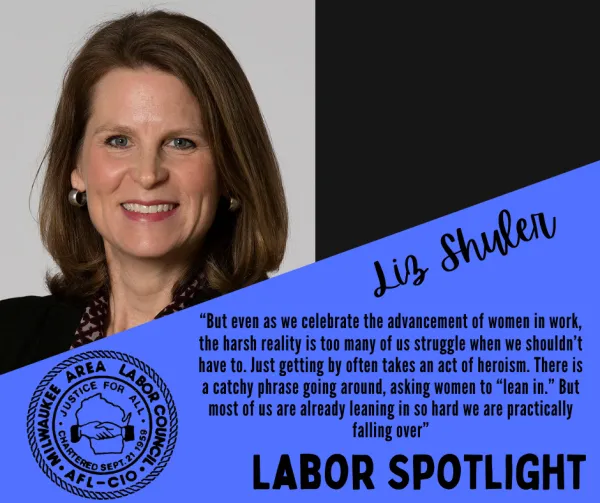Labor Spotlight- Liz Shuler

Elizabeth H. Shuler is the AFL-CIO’s Secretary-Treasurer, its second ranking officer, the first woman elected to the position, and the youngest woman ever on the federation’s Executive Council. First elected in 2009, she is the federation’s chief financial officer and oversees its operations.
Liz leads the AFL-CIO’s initiatives on the future of work, the clean energy economy, workforce development, and empowering women and young workers. Liz is committed to busting myths about labor, leveraging the labor movement’s diversity for innovative approaches to social justice, and making the benefits of a union voice on the job available to working families everywhere.
Shuler grew up in a union household—her father, Lance, was a power lineman and longtime member of IBEW Local 125 at Portland General Electric and her late mother, Joyce, worked as an estimator in the company’s service and design department. A summer job in the payroll department at PGE during college revealed for Shuler how the clerical workers, who were not in the union, didn’t have the same bargaining power or respect on the job as their unionized counterparts. In 1993, Shuler was hired at Local 125, where she was thrust into a full-fledged campaign to help the clerical workers organize. The organizers on staff at the local were all men, so Liz was assigned to house-calling, since most of the clerical employees were women. “Those were challenging times,” she recalls. “The company was holding captive-audience meetings and people were scared, so it was really tough to even get invited into their homes to talk.” That organizing experience showed Liz how important it was to build mobilizing capacity within the local union, particularly for women workers.
As most union representatives do, she wore many hats while working at the local: she traveled across the local’s multi-state jurisdiction conducting organizing training for the 5,000-member local’s 36 different bargaining units; developed a political action committee and member education; formed local networks to bolster the union’s legislative power at the state capital in Salem.
Shuler’s outstanding work made the IBEW take notice. In 1998, then-Secretary-Treasurer Edwin Hill temporarily assigned her to California where she mobilized IBEW members to help defeat Proposition 226, the so-called “Paycheck Protection” proposition that threatened the lifeblood of union political fundraising. That victory prompted then-President J. J. Barry to hire her as an international representative in the union’s Political/Legislative Affairs Department in Washington, D.C. She lobbied Congress on such issues as energy and electricity, telecommunications, Davis-Bacon, health care, transportation, apprenticeship and training, pension reform, unemployment and telecommunications; raised PAC funds; developed political education programs; and mobilized local unions throughout the country during elections. In 2004, she was promoted to assistant to the International President, advising President Ed Hill on program implementation and strategy and overseeing the work and budgeting of 11 departments ranging from Utility and Manufacturing to Telecommunications and Government.
She is especially proud of the role she played in advancing the IBEW’s Code of Excellence, a program adopted by Hill in 2005 to renew union members’ pride in workmanship and guarantee to employers that workers were committed to a hard day’s work for a full day’s pay. It began with the construction branch of the IBEW and Shuler worked to broaden it to the professional and industrial branches.
“If we’re going to rebuild the labor movement, we need to start with a commitment to quality work to show that unions make a difference not only for workers and their families, but also for our employer partners,” she says. “Unions add value, and the IBEW is demonstrating how this added value translates to new work opportunities for its members.”
Shuler recognizes the labor movement’s future depends on its ability to reach out and engage young people in their unions and communities. Shuler led the launch of the AFL-CIO’s Next Up Young Workers Initiative to open up leadership opportunities and create a space for youth activism.
Shuler’s efforts to broaden the union movement to engage young people and her work to improve the economy for all working people challenges assumptions about the “old fashioned” labor movement. Shuler looks at technological change as an opportunity to be relevant to the next generation workforce. Technology offers new opportunities and challenges to strengthen worker voice and new pathways for workers to learn skills and stay relevant in a changing economy. She knows that digital tools can help workers organize in new and powerful ways, and that the labor movement should be on the cutting edge of change.
Source: aflcio.org
